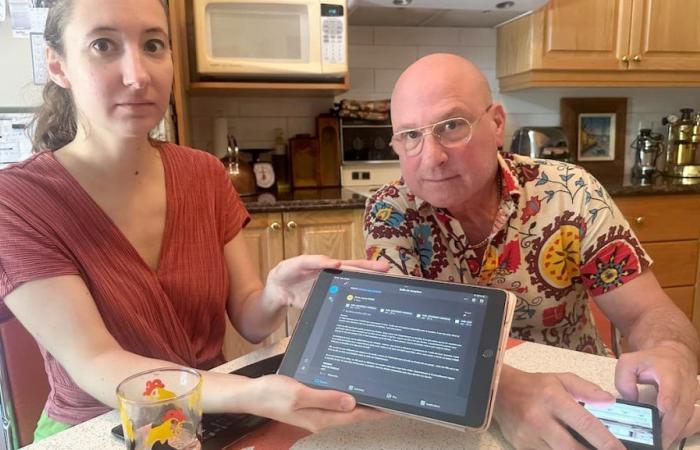In Montreal, journalist Louis-Philippe Messier travels mostly on the run, his desk in his backpack, on the lookout for fascinating subjects and people. He speaks to everyone and is interested in all walks of life in this urban chronicle.
You are moving on 1is July? Beware of misleading emails and fake ads, because as the big moving day approaches, scams targeting tenants are rife. A Montreal couple looking for an apartment for their son managed to dodge them thanks to their instincts, but are left with a bitter taste when it comes to rental platforms.
During the current housing crisis, the plight of apartment seekers is being exploited by fraudsters who send fake emails asking for a deposit or post fake ads on various platforms.
“We wasted time and energy corresponding with pseudo-owners who ended up demanding an Interac transfer before the first visit, supposedly to ensure that we were serious about the approach,” says Jezebel Bourg.
The fake owners have long explanations to justify their request for a “deposit” before the visit…
Photo LOUIS-PHILIPPE MESSIER
“I almost took the bait, but when I was told that the payment had to be made to a third person presented as an assistant, I understood that it was complete nonsense!” remembers Marc Bourg, her partner.
When suddenly the fake owner asks for a payment, it is under another name… supposedly an assistant.
Photo LOUIS-PHILIPPE MESSIER
At least three of the online classified ads the Bourgs responded to turned out to be fraudulent; several others were shady.
The modus operandi? They always ask for a deposit at one point or another, even though the law prohibits it. Know it!
Badly caught and vulnerable
These searches in Marketplace were aimed at finding an apartment for Mr. Bourg’s son.
“Following a breakup, I found myself at my father’s house and I wanted to find something before the end of the month, so I was a good potential victim,” confides Marc-Antoine Bourg-Lavallée.
Disgusted with the scam attempts in Facebook (Marketplace), he decided to return to traditional search methods.
“I was sick of the fake listings and thought, ‘To hell with Marketplace!’ I went for a walk in the neighborhood where I wanted to live. I wrote down the number of a homeowners’ association on a building and called… A few days later, they told me there was a vacancy. I live there now.”
Marc-Antoine Bourg-Lavallée finally found an apartment (a real one, this time) after giving up on online ads and instead walking around in person, looking for opportunities in the neighborhood.
COURTESY OF MARC-ANTOINE BOURG
The Bourgs, however, remain bitter about their experience with Marketplace.
“My son spoke to a friend who saw the same fake ads and was asked the same things by other fake names, so we thought it was worth talking to the Journal to raise awareness among people,” concludes Marc Bourg.
Is it so bad?
I tried the experiment myself: I typed “3 1⁄2 for rent” into the search bar of the Facebook virtual fair.
The second ad seems suspicious: price too low, description where everything is included (even the dishes), seller’s Facebook account created in 2024, etc.
It’s still offered, I am told, but the owner will come from afar for the visit. We immediately require a lot of personal information (photocopy of my passport, notice of assessment, pay stubs, etc.) and a deposit of two months’ rent.
I’m asked for information right away, supposedly so they can pre-approve me before the visit…
Photo LOUIS-PHILIPPE MESSIER
Without providing my information (not wanting to facilitate my identity theft), I go in person to the address indicated. During my visit, however, I cannot speak to anyone.
The name of the owner indicated on the property assessment roll has nothing in common with those (false) with which I dealt. And the decor seen through the windows in the ad photograph is not that around the real building.
A certain “Céline” shows me this accommodation as being located in Hochelaga, but that’s not what the decor seen in the windows says… which seems rather European to me! I went to the address in the ad (near Viau station) and the surroundings have nothing to do with it…
Photo LOUIS-PHILIPPE MESSIER
“The fraudster plays win-win. He obtains information that may allow him to obtain a credit card with his victim’s identity or take over his bank account. If the victim goes so far as to send an Interac transfer, it’s a jackpot!” comments Éric Parent, CEO of EVA Technologies and security specialist.
To avoid being cheated by a rental ad
1) Be wary of sellers whose Facebook account appears fake or was recently created.
2) Check if the name of the seller matches that of the owner of the building in the property assessment role of your city (accessible on the internet).
3) Never hand over personal information or scanned copies of your personal documents, tax statements or passport.
4) Never make an Interac transfer before a visit. A fraudster can often cash out the money without needing a password.






